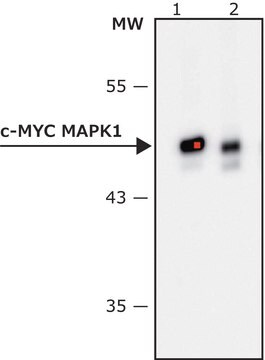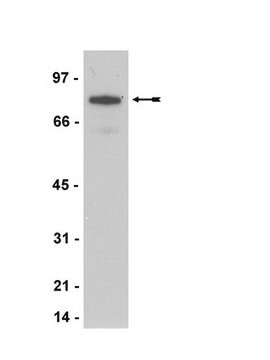16-213
Anti-Myc Tag Antibody, clone 4A6, HRP conjugate
clone 4A6, Upstate®, from mouse
Sinónimos:
Transcription factor p64, avian myelocytomatosis viral oncogene homolog, myc proto-oncogene protein, v-myc avian myelocytomatosis viral oncogene homolog, v-myc myelocytomatosis viral oncogene homolog (avian)
About This Item
Productos recomendados
biological source
mouse
Quality Level
conjugate
peroxidase conjugate
antibody form
purified immunoglobulin
antibody product type
primary antibodies
clone
4A6, monoclonal
species reactivity
human
manufacturer/tradename
Upstate®
technique(s)
western blot: suitable
NCBI accession no.
UniProt accession no.
shipped in
dry ice
target post-translational modification
unmodified
Gene Information
human ... MYC(4609)
General description
Specificity: Recognizes and is specific for recombinant proteins containing the Myc epitope tag (EQKLISEEDL) in a variety of sequence contexts. Also recognizes human Myc.
Species Cross-reactivity: Human, others not tested
Ig Type: IgG
Host: Mouse
Molecular Weight: Varies depending upon the protein which is tagged
Specificity
Immunogen
Application
Epitope Tags & General Use
Epitope Tags
Quality
Western Blot Analysis:
1:500 dilution of this antibody detected myc-PP2A on 10 µg of Myc-PP2A A subunit transfected NIH/3T3 lysates.
Target description
Physical form
Storage and Stability
Analysis Note
Positive control for human Myc: Widespread expression including A431 cell lysate, ovarian cancer cell lysate, or breast carcinoma tissue. Myc fusion protein expressed in cells.
Other Notes
Legal Information
Disclaimer
¿No encuentra el producto adecuado?
Pruebe nuestro Herramienta de selección de productos.
signalword
Warning
hcodes
Hazard Classifications
Aquatic Chronic 2 - Skin Sens. 1
Storage Class
10 - Combustible liquids
wgk_germany
WGK 3
flash_point_f
390.2 °F - closed cup - Information refers to the main ingredient.
flash_point_c
199 °C - closed cup - Information refers to the main ingredient.
Certificados de análisis (COA)
Busque Certificados de análisis (COA) introduciendo el número de lote del producto. Los números de lote se encuentran en la etiqueta del producto después de las palabras «Lot» o «Batch»
¿Ya tiene este producto?
Encuentre la documentación para los productos que ha comprado recientemente en la Biblioteca de documentos.
Los clientes también vieron
Nuestro equipo de científicos tiene experiencia en todas las áreas de investigación: Ciencias de la vida, Ciencia de los materiales, Síntesis química, Cromatografía, Analítica y muchas otras.
Póngase en contacto con el Servicio técnico














